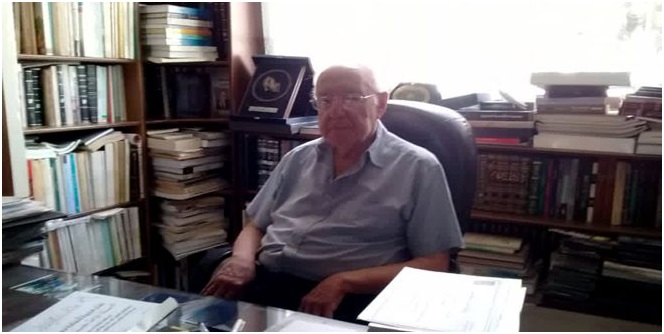Historian Muhammad Qajjah is considered as Aleppo’s Literary and Historical Encyclopedia and a Curriculum of Human Knowledge
The researcher and writer Muhammed Qajjah excelled in various types of humanities. His life was abundant and full of practical and professional richness, and his Syrian cultural presence held an important position until he was called the “Historical and Literary Encyclopedia of Aleppo.”
The son of the city of Aleppo has published nearly 20 books and co-authored twenty other books. He has about 300 lectures that he gave in Syria and the Arab world. He worked in several fields such as education, culture and heritage, and held several positions in many associations, councils, committees, and unions.
In a meeting with SANA, Qajjah noted that he was born into a cultural family and his father had a collection of books and manuscripts that he inherited from his father and grandfather. His eyes opened to valuable books that he had seen. Al-Mutanabbi’s Diwan was his first friend, who found reading it a great pleasure, and as a result, he has a cultural dimension. He was keen on buying and acquiring books until he owned a library that currently contains 13,000 books.
He obtained a BA in Arabic literature from Damascus University. As one of those interested in reading history and connoisseurs of its methods and appraisers of its benefits and advantages, he continued his postgraduate studies in the history of Andalusia and the Levant in Algeria. He indicated that most of his writings and articles in newspapers and his books were directed according to two main axes, the first is writing in literary criticism studies and the second writing in historical studies related to Islamic history.
He pointed out that what makes history is the mental movement, but there must be emotions and love that support this movement and guide it in this rational line in which he headed. If he imagines to live in one of the historical eras, he will live in the era of Cordoba, Andalusia, when it was the capital of thought and culture in the world and which presented, through the Arabic language, the foundations of the enlightenment upon which the Renaissance was based.
Regarding the cultural role of Al-Adiyat association in his life, he said, “I was a member of it fifty years ago and took over its presidency in 1994. During this 25-year period, I was able to supplement its library with more than 15,000 titles, while it contained only 200 books, in addition to hundreds of recorded tapes, videotapes and thousands of photos and documents.”
Also, Al-Adiyat quarterly magazine and a quarterly book were issued in cooperation with the University of Aleppo called (Al-Adiyat Aleppo), which includes archaeological, historical and heritage research and lectures. He referred to holding weekly lectures and seminars, raising the number of the association’s branches from two to 15, and setting up trips to archaeological areas in Syria. He indicated that the reason for the association’s success is its interest in the cultural aspect and its work in a democratic-voluntary manner.
Regarding the city of Aleppo’s share in his books, he said, “My family has been in Aleppo for 600 years, and our old Arab house is 330 years old and has the writing of 1110 AH. I’m deeply rooted in the city of Aleppo, which was born with history, as Aleppo is 12 thousand years BC.”
Regarding the selection of Aleppo as the capital of Islamic culture, he asserted that in 2006 the Islamic Organization for Culture and Science decided to choose cities that it named the capitals of Islamic culture, in response to the phenomenon (Islamophobia) that spread in the Western media. Makkah Al-Mukarramah, was the first city chosen in 2005, then a number of criteria were laid down for the selection. So Aleppo was the first to embody these standards as it included all Islamic standards that represent all eras from the Rashidun era until today, in addition to its decisive economic role in history as a major station on the International Silk Road, and its huge cultural size, especially in the court of Saif al-Dawla al-Hamdani.
Qajjah pointed out that the city of Aleppo has passed through 30 civilizations and was subjected to several invasions and was always rising from the ashes, and thus, UNESCO selected it, Beirut and Alexandria and named them as cosmopolitan cities, meaning that they have ethnic, religious and cultural diversity.
On the making of history, he stressed that history is made by man, and we must find the objective reasons for an event to occur.
Qajjah sent a message to the Syrian youth, saying, “Young people today call themselves the Internet generation, as development imposes itself and we must direct the cultural environment to serve this global trend and this generation should not be cut off from the heritage and should provide humanity with what can be of benefit.”
At the conclusion of his speech, Qajjah pointed out that Syria was subjected to a bitter experience that negatively affected the cultural, social and economic movement, but despite these difficulties, it is still steadfast and fine because cultural activity did not stop in cultural centers and associations, as well as the attention of the educational curricula, the media and the Ministry of Culture in Syria to the tangible and intangible heritage, with an enlightened scientific vision that respects history.
Inas Abdulkareem

